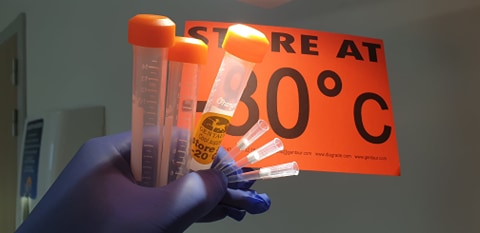The antibodies are one of the most widely used tools in research laboratories to identify, isolate or block various molecules. Due to the specificity assumed, it is essential to validate the antibodies for use in each of the techniques in which they are going to be applied, since, as we have seen on other occasions, an antibody can be very specific, for example in an ELISA immunoassay , and yet give a very weak signal in other types of tests such as Western Blot .
Validating the antibodies implies testing the following aspects:
- Antibody specificity in the selected technique
- Affinity for antigen
- Reproducibility between trials
In this post we collect some tips to guide you when validating the antibodies and defining their specificity.
Main Problems With Antibodies, How To Solve Them?
The most common problems that arise from the use of antibodies are cross-reactivity, variability between batches and their application in an incorrect technique.
1.- CROSS REACTIVITY
- Problem: Antibodies not only bind to the target antigen, but also to other proteins present in the sample.
2.- VARIABILITY BETWEEN LOTS
- Problem: It is more frequent in the case of polyclonal antibodies, since the same antibody produced in different animals could work slightly differently.
3.- WRONG APPLICATION
- Problem: The different techniques and experimental conditions in which each one is carried out can modify the folding of the target protein, and consequently, its ability to bind to the antibody.
To avoid any of these problems, it is vitally important to validate the antibodies before use.
But how do you do it? Pay attention to the trials we list below.

Assays To Validate The Antibodies
Antibodies can be validated by a multitude of functional tests, each of which has its advantages and disadvantages:
ELISA
- Pros:
- Quantitative test, allows confirmation of sensitivity.
- High performance assay, a high number of samples can be processed simultaneously.
- Cons:
- It does not determine whether the antibody can lead to cross reactivity.
WESTERN BLOT (WB)
- Pros:
- Qualitative test, easy and simple to carry out.
- Ideal for denatured proteins.
- Cons:
- Difficult to optimize.
- It takes a lot of time.
- Only a few antibodies can be tested at the same time.
IMMUNOHISTOCHEMISTRY (IHC) / IMMUNOCYTOCHEMISTRY (ICC)
- Pros:
- Relatively low-cost techniques.
- Qualitative test.
- Cons:
- Difficult to standardize.
- The accessibility of epitopes can vary in fixed tissues.
- It does not determine whether the antibody non-specifically recognizes other proteins with the same cell location.
FLOW CYTOMETRY (FC)
- Pros:
- High performance assay, a high number of samples can be processed simultaneously.
- Easy to optimize.
- Cons:
- It does not determine whether the antibody can lead to cross reactivity.
KNOCKDOWN siRNA
- Pros:
- KnockDown cell lines can be used in all assays: WB, IHC / ICC, FC …
- Cons:
- KnockDown is transitory.
- Difficult to optimize.
KNOCKOUT CELL LINES (KO)
- Pros:
- They guarantee that there will be no expression of the target gene, so they are excellent negative controls, guaranteeing the specificity of the antibody.
- They can be used in all tests: WB, IHC / ICC, FC …
- Cons:
- KnockOut cell lines against specific genes are not always viable.
MASS SPECTROMETRY (MS)
- Pros:
- High performance assays, a high number of samples can be processed simultaneously.
- Cons:
- Requires the use of a mass spectrometer and qualified personnel.
- Difficult to optimize.
Other Considerations To Take Into Account To Validate The Antibodies
1.- The choice and preparation of cell lines or tissue samples , using the corresponding positive and negative controls, and taking into account whether the antibody recognizes the protein in its native or denatured form.
2.- The protocols , paying special attention and optimizing the incubation times individually (very short periods can affect sensitivity, and on the contrary, excessive incubation times could result in background noise problems), dilutions of work, blocking conditions, etc.
3.- The choice of buffers , determining the optimum in each case.

